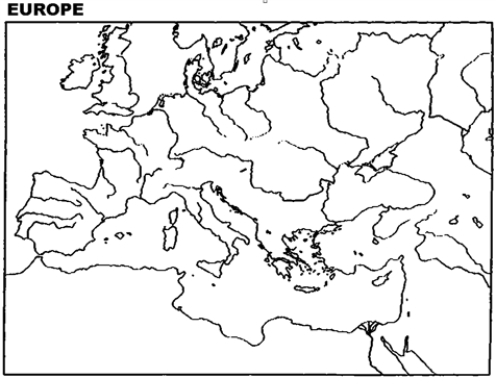Exam 10: Intellectual Transformation: the Scientific Revolution and the Age of Enlightenment
Exam 1: The Ancient Near East: the First Civilizations82 Questions
Exam 2: The Hebrews: a New View of God and the Individual76 Questions
Exam 3: The Greeks: From Myth to Reason95 Questions
Exam 4: Rome: From City-State to World Empire92 Questions
Exam 5: Early Christianity: a World Religion79 Questions
Exam 6: The Rise of Europe: Fusion of Classical,christian,and Germanic Traditions89 Questions
Exam 7: The Flowering and Dissolution of Medieval Civilization84 Questions
Exam 8: Transition to the Modern Age: Renaissance and Reformation91 Questions
Exam 9: Political and Economic Transformation: National States, overseas Expansion, commercial Revolution84 Questions
Exam 10: Intellectual Transformation: the Scientific Revolution and the Age of Enlightenment85 Questions
Exam 11: The Era of the French Revolution: Affirmation of Liberty and Equality92 Questions
Exam 12: The Industrial Revolution: the Transformation of Society78 Questions
Exam 13: Thought and Culture in the Early Nineteenth Century82 Questions
Exam 14: Surge of Liberalism and Nationalism: Revolution, counterrevolution, and Unification76 Questions
Exam 15: Thought and Culture in the Mid-Nineteenth Century: Realism, positivism, darwinism, and Social Criticism86 Questions
Exam 16: Europe in the Late Nineteenth Century: Modernization, nationalism, imperialism93 Questions
Exam 17: Modern Consciousness: New Views of Nature, human Nature, and the Arts77 Questions
Exam 18: World War I: the West in Despair83 Questions
Exam 19: An Era of Totalitarianism88 Questions
Exam 20: World War II: Western Civilization in the Balance56 Questions
Exam 21: Europe After World War II: Recovery and Realignment, 1945-198959 Questions
Exam 22: The Troubled Present55 Questions
Select questions type
All of the following are true of the Encyclopedia except
Free
(Multiple Choice)
4.7/5  (38)
(38)
Correct Answer:
E
How did the philosophes view the place and role of women in society?
Free
(Essay)
4.9/5  (32)
(32)
Correct Answer:
The philosophes generally viewed the place and role of women in society as limited and subordinate to men. They believed that women's primary role was to be wives and mothers, and that they should be obedient and submissive to their husbands. They also believed that women were not as intellectually capable as men and therefore should not participate in politics or public life. Overall, the philosophes held traditional and conservative views on the place and role of women in society.
Enlightenment philosophes generally approved of Thomas Hobbes's
Free
(Multiple Choice)
4.8/5  (32)
(32)
Correct Answer:
C
Please define the following key terms. Show Who? What? Where? When? Why Important?
-Discourse on Method
(Essay)
4.8/5  (39)
(39)
____ searched for an absolute truth that could serve as the first principle of knowledge.
(Multiple Choice)
4.8/5  (42)
(42)
Which French mathematician and philosopher is regarded as the founder of modern philosophy?
(Multiple Choice)
4.9/5  (39)
(39)
Please use this outline map of Europe to answer the question(s).
 -On a blank map of Europe,locate the following areas where there was considerable Enlightenment disputation: Paris,Berlin,Moscow,Budapest,London,and the Hague.
-On a blank map of Europe,locate the following areas where there was considerable Enlightenment disputation: Paris,Berlin,Moscow,Budapest,London,and the Hague.
(Not Answered)
This question doesn't have any answer yet
Please define the following key terms. Show Who? What? Where? When? Why Important?
-Candide
(Essay)
4.9/5  (32)
(32)
Modern astronomy began with ____,a Polish astronomer,mathematician,and church canon.
(Multiple Choice)
4.8/5  (39)
(39)
Please define the following key terms. Show Who? What? Where? When? Why Important?
-Mary Wollstonecraft
(Essay)
4.9/5  (47)
(47)
Which political thinker would generally support a benevolent dictator?
(Multiple Choice)
4.8/5  (34)
(34)
In what ways was the Enlightenment a threat to the old regimes in Europe?
(Essay)
4.9/5  (35)
(35)
The new model put forth by Copernicus and Galileo that believed that the planets orbited the sun was known as
(Multiple Choice)
4.9/5  (35)
(35)
Which of the following statements about Mary Wollstonecraft is correct?
(Multiple Choice)
4.8/5  (31)
(31)
Please define the following key terms. Show Who? What? Where? When? Why Important?
-Platonic ideas
(Essay)
4.9/5  (37)
(37)
Please define the following key terms. Show Who? What? Where? When? Why Important?
-Diderot
(Essay)
4.7/5  (32)
(32)
Showing 1 - 20 of 85
Filters
- Essay(0)
- Multiple Choice(0)
- Short Answer(0)
- True False(0)
- Matching(0)